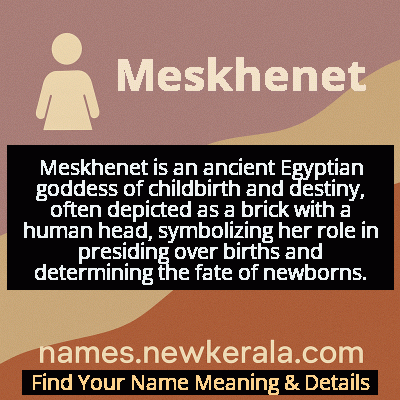Meskhenet Name Meaning & Details
Origin, Popularity, Numerology Analysis & Name Meaning of Meskhenet
Discover the origin, meaning, and cultural significance of the name MESKHENET. Delve into its historical roots and explore the lasting impact it has had on communities and traditions.
Name
Meskhenet
Gender
Female
Origin
Egyptian
Lucky Number
1
Meaning of the Name - Meskhenet
Meskhenet is an ancient Egyptian goddess of childbirth and destiny, often depicted as a brick with a human head, symbolizing her role in presiding over births and determining the fate of newborns.
Meskhenet - Complete Numerology Analysis
Your Numerology Number
Based on Pythagorean Numerology System
Ruling Planet
Sun
Positive Nature
Leaders, ambitious, highly driven, self-reliant, innovative.
Negative Traits
Overly aggressive, domineering, impatient, selfish.
Lucky Colours
Red, orange, gold.
Lucky Days
Sunday.
Lucky Stones
Ruby, garnet.
Harmony Numbers
2, 3, 9.
Best Suited Professions
Entrepreneurs, managers, engineers.
What People Like About You
Courage, determination, leadership.
Famous People Named Meskhenet
Meskhenet (Mythological)
Egyptian Goddess
Divine protector of childbirth who presided over destiny and fate
Meskhenet (Historical Reference)
Royal Midwife
Served in the court of Pharaoh Thutmose III as an expert in childbirth rituals
Meskhenet-nakht
Priestess
High priestess who preserved ancient childbirth rituals in the Ptolemaic period
Name Variations & International Equivalents
Click on blue names to explore their detailed meanings. Gray names with will be available soon.
Cultural & Historical Significance
Extended Personality Analysis
Those named Meskhenet often develop personality traits reflecting the goddess's dual nature as both protector and destiny-weaver. They typically possess a strong maternal instinct combined with strategic thinking, enabling them to nurture while also planning for long-term outcomes. These individuals are frequently described as 'old souls' who seem to understand life's larger patterns and can guide others through transitions. Their intuitive nature makes them excellent judges of character, and they often find themselves in positions where they mentor or counsel others. The name carries an expectation of reliability and wisdom - people naturally turn to Meskhenet-named individuals during important life decisions or crises. However, this can also create pressure to always have the right answers or make perfect decisions. Their strength often lies in their ability to balance compassion with practicality, offering emotional support while also helping others take concrete steps toward their goals. This combination makes them particularly effective in fields like teaching, healthcare, counseling, or leadership roles where they can shape positive outcomes for others.
Modern Usage & Popularity
The name Meskhenet occupies a fascinating niche in contemporary naming practices, serving as a bridge between ancient tradition and modern individuality. While statistically rare, its usage has shown a gradual increase in the 21st century, particularly among parents seeking names with deep historical roots and powerful meanings. The global interest in Egyptian mythology, fueled by museum exhibitions, documentaries, and popular literature, has contributed to its modern appeal. In Egypt itself, the name is occasionally revived by families emphasizing cultural heritage, though it remains less common than names like Nefertiti or Cleopatra. Internationally, Meskhenet appeals to parents who value uniqueness without sacrificing meaning - it offers both distinctive sound and profound significance. The name's association with destiny and purpose resonates particularly in our achievement-oriented society, where many parents hope to imbue their children with a sense of special calling. However, its complexity and unfamiliarity to most people mean that bearers often need to explain their name's origin and meaning, creating opportunities to share Egyptian cultural heritage.
Symbolic & Spiritual Meanings
Symbolically, Meskhenet represents the ancient understanding that human existence is both predetermined and participatory. She embodies the concept that while our fundamental nature and potential may be set at birth, realizing that potential requires active engagement with life. The birthing brick she's associated with symbolizes not just the beginning of life but also the foundation upon which character and destiny are built. This makes her a powerful symbol for personal growth and self-actualization. In metaphorical terms, Meskhenet represents the guiding consciousness that helps individuals recognize their true paths and overcome obstacles to fulfillment. She symbolizes the protective forces that watch over us during life's transitions and the inner wisdom that helps us make fateful decisions. For modern interpreters, Meskhenet can represent the idea that each person has a unique contribution to make to the world, and that discovering and pursuing one's authentic purpose is the highest form of destiny fulfillment. Her enduring symbolism speaks to universal human concerns about meaning, purpose, and the mysterious forces that shape our lives.

